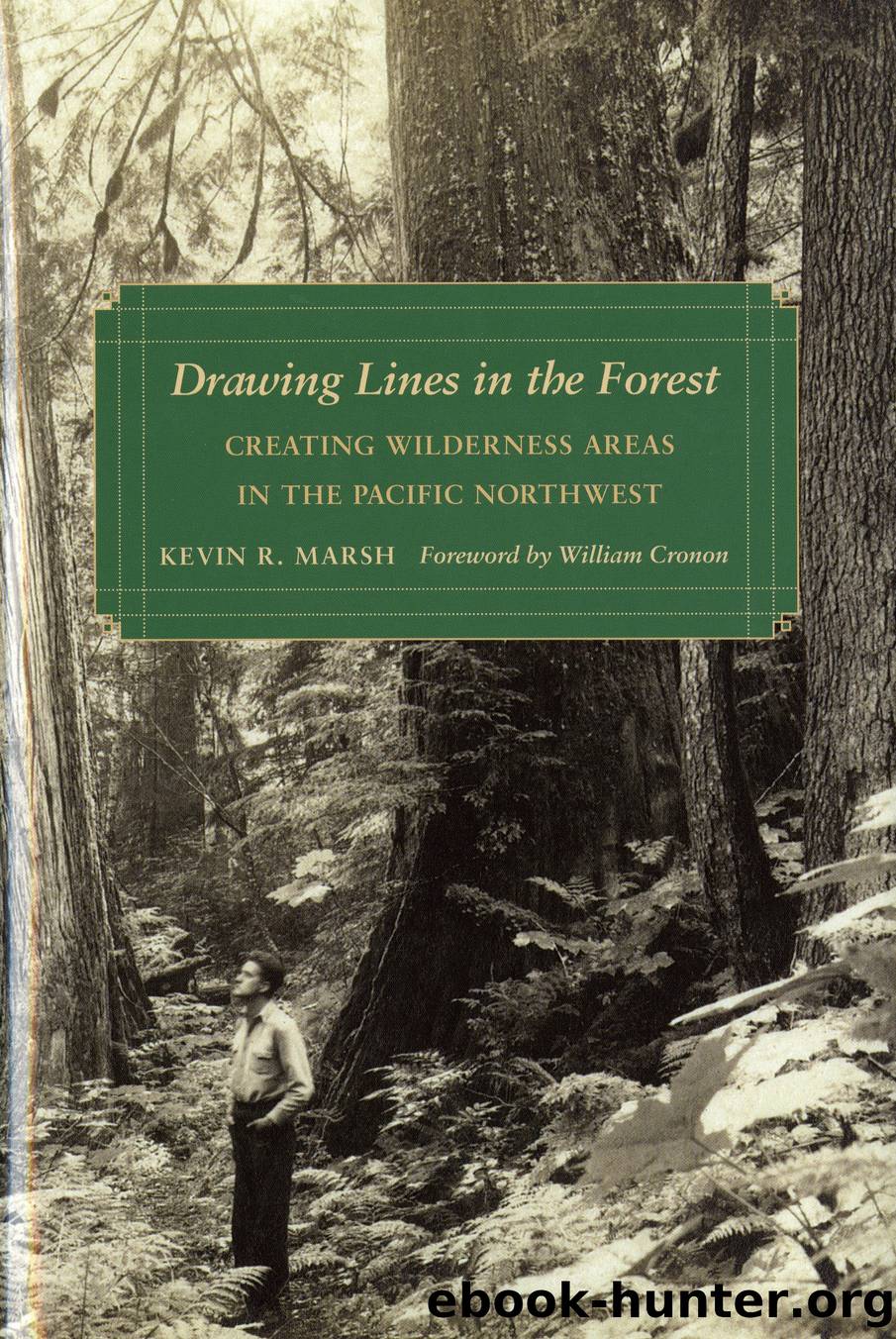Drawing Lines in the Forest by Kevin R. Marsh

Author:Kevin R. Marsh
Language: eng
Format: epub
ISBN: 9780295989860
Publisher: University of Washington Press
By 1970, the effort to protect French Pete Creek from commercial logging turned to Congress, where it joined other efforts to preserve de facto wilderness. Frustration with the agency's unwillingness to consider an alternative to logging in the valley and their combative relations with the Willamette National Forest pushed wilderness activists toward cultivating support in Congress. Holway Jones wrote to Senator Packwood in 1973, âOur sincere hope is that you, as our strongest champion for preservation of wilderness lands in Oregon, will help us overcome legislatively, if at all possible, what we apparently cannot accomplish administratively.â36
By the 1980s, most Oregonians could not stretch their imaginations far enough to define Senator Packwood as a champion of wilderness preservation. âBob Plywoodâ was a derogatory moniker used by environmentalists in later years, but in his first term, as environmental activist Andy Kerr later noted, âthere wasn't an Oregon politician better on environmental issues than Senator Bob Packwood.â37 When French Pete activists turned to Congress to find a way to challenge Forest Service insistence on logging in the area, Packwood was their strongest supporter. His political courage at the time cannot be overestimated. Pack-wood stood alone within the state congressional delegation. Even Governor Tom McCall, the political maverick who exemplified Oregon's image in the early 1970s as a haven of environmental concern, would not take on the timber industry. He remained an opponent of wilderness designation in forested regions of the state.38
In 1972, Packwood reintroduced the Save French Pete Committee's measure to designate an intermediate recreation area, which would ban commercial timber sales and road construction in the valley. It did allow for salvage logging of dead or dying trees by use of helicopters, but dispersed backcountry recreation would receive priority status for the area. The Senate held committee hearings in May 1972, where Doug Scott, then with the Wilderness Society, noted, âThis is the first time, in 20 years of continuing controversy, as Senator Packwood has noted, that this issue has been taken out of administrative channels to be heard at the Congressional level.â39
It was also the first time since 1955 that any public hearing had been held on the issue. Although Senator Hatfield, who opposed Packwood's bill, did not allow his committee to hold field hearings in Eugene, students and citizens there organized their own hearings, complete with an empty chair for Senator Hatfield. Packwood later had the transcript printed in the Congressional Record.40 Hatfield's status as the senior senator in the state delegation and his seat on the Interior Committee ensured that Packwood's bill would not pass, but it continued to cultivate awareness of French Pete as a major national issue in environmental politics.
Senator Packwood's bill was not a wilderness bill, and it raised strategic concerns among those who wanted to prevent logging in French Pete. Although their ultimate goal was to add this area to the Three Sisters Wilderness, many felt they did not have the time for a long-term campaign. This concern led the Save French Pete Committee to
Download
This site does not store any files on its server. We only index and link to content provided by other sites. Please contact the content providers to delete copyright contents if any and email us, we'll remove relevant links or contents immediately.
| United States |
In Cold Blood by Truman Capote(3374)
The Innovators: How a Group of Hackers, Geniuses, and Geeks Created the Digital Revolution by Walter Isaacson(3127)
Steve Jobs by Walter Isaacson(2888)
All the President's Men by Carl Bernstein & Bob Woodward(2362)
Lonely Planet New York City by Lonely Planet(2210)
And the Band Played On by Randy Shilts(2185)
The Room Where It Happened by John Bolton;(2144)
The Poisoner's Handbook by Deborah Blum(2126)
The Innovators by Walter Isaacson(2096)
The Murder of Marilyn Monroe by Jay Margolis(2089)
Lincoln by David Herbert Donald(1979)
A Colony in a Nation by Chris Hayes(1920)
Being George Washington by Beck Glenn(1886)
Under the Banner of Heaven: A Story of Violent Faith by Jon Krakauer(1787)
Amelia Earhart by Doris L. Rich(1684)
The Unsettlers by Mark Sundeen(1682)
Dirt by Bill Buford(1667)
Birdmen by Lawrence Goldstone(1659)
Zeitoun by Dave Eggers(1640)
